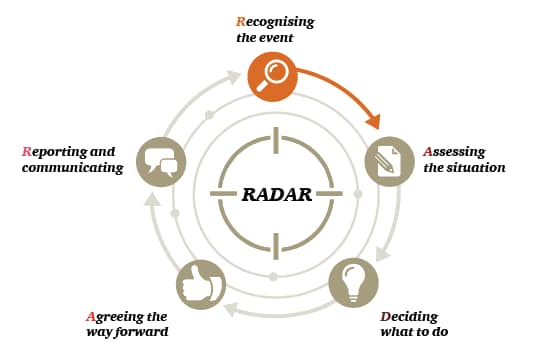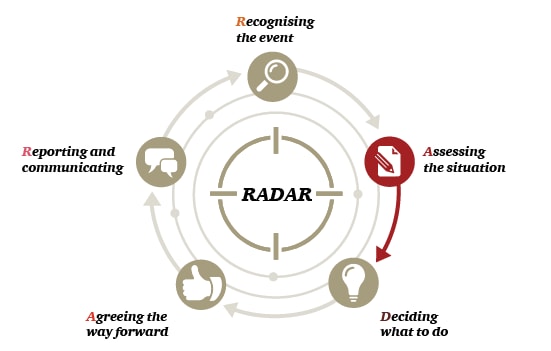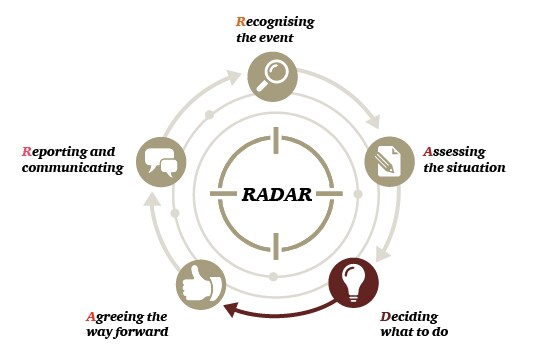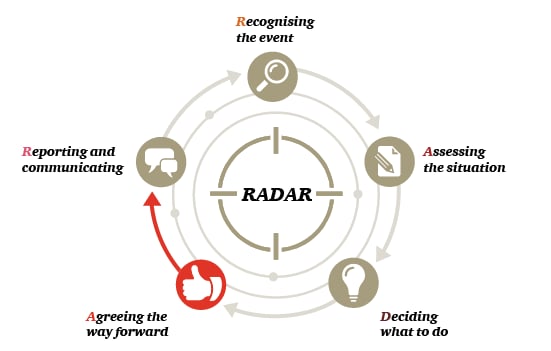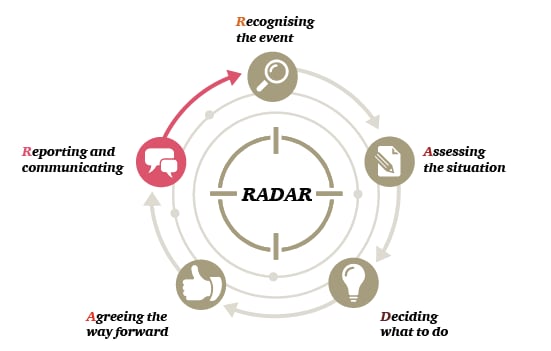PwC's Code of Conduct

*Please note: access to hyperlinks in text is limited to PwC partners and staff.
The Code in Context
Our Purpose and values are the foundation of our success. We exist to build trust and solve important problems, and our values help us deliver on that Purpose.
This Code underpins our ability to behave in a manner consistent with our values.
Our Code is not meant to provide specific guidance on every situation where we might need to answer the question, “What is the right thing to do?” Instead, it is principle-based guidance that helps us think about difficult questions, promotes consultation, and encourages us to speak up if we have concerns. Using right-hand navigation or by continuing to scroll, you will find details on RADAR (Recognise, Assess, Decide, Agree, Report), which is our framework for helping us decide the right thing to do.
This Code describes a common set of expectations for our conduct, a key element of which is that we abide by applicable laws and regulations. To the extent any local law or regulation is more restrictive than this Code, local law or regulation governs. Network and local policies and supplemental guidance complement the principles embodied in this Code and the PwC Network Risk Management Policies.
The Organisation for Economic Co-operation and Development (OECD) provides guidance, including the OECD Guidelines for Multinational Enterprises (the OECD Guidelines), by way of non-binding principles and standards for responsible business conduct when operating globally. The OECD Guidelines provide a valuable framework for setting applicable compliance requirements and standards. Although the PwC network consists of firms that are separate legal entities which do not form a multinational corporation or enterprise, PwC’s network standards and policies are informed by and meet the goals and objectives of the OECD Guidelines.
This Code applies to all of us. When we say “we” “our” or “us” we are referring to all of us at PwC, individual partners/principals and staff, as well as the individual firms that together form the PwC network.
Speak up
Speaking up is crucial to our culture and our long term results—it is a living example of our values. Speaking up when something doesn’t seem right demonstrates our integrity and that we have the courage to do the right thing. Speaking up helps to prevent mistakes and misconduct and foster innovation. Speaking up shows that we care about each other and our business. And speaking up to get things right or keep them on track helps us live up to our commitment to deliver high quality outcomes.
Something doesn’t seem right? Facing a dilemma? Have a question that leads to more difficult questions? Need advice?
Consult. Pick up the phone. Send an email. Set up a meeting. Speak up.
Each of us, no matter what our level or role, is empowered to speak up when dealing with behaviour or facing a situation that doesn’t seem right. Each of us has a responsibility to report and express our concerns, and to do so fairly, honestly, and professionally.
Do not ignore it. Do not stay silent.
Collaboration means we consult with our colleagues in matters large and small, and we know that our concerns are heard and addressed in an open and professional manner, including that an investigation will take place when warranted. We consult with our supervisors, coaches, partners/principals, ethics teams, Risk and Quality teams, Office of the General Counsel, Human Capital representatives, or others at PwC, particularly those in reporting lines. These people are responsible for addressing or escalating as necessary the issues brought to their attention. We raise issues using formal and informal methods as appropriate: in person, over the phone, and/or electronically.
We protect against retaliation
In being true to the values of integrity and care—if you report a concern, it will be handled with appropriate confidentiality and discussed with others only as needed or advisable under the circumstances. Exercising professional scepticism, applying common sense, and knowing and applying the Code as well as the local supplementary guidance, will help each of us know when to speak up through whichever channel we are most comfortable.
As well as the resources listed here, each firm in the PwC network provides a mechanism to report issues:

Speak up. It’s the right thing to do. These are the moments that matter.
PwC is committed to protecting our people against retaliation. Retaliation is serious misconduct that will not be tolerated, and any PwC professional (including partners/principals or staff) who takes retaliatory action will be held accountable.
Q. What is retaliation?
A. Retaliation can be any form of reprisal, direct or subtle, for reporting in good faith actual or suspected issues.
We consult with our:
- Supervisors
- Coaches
- Partners/Principals
- Ethics teams
- Risk and Quality teams
- Office of the General Counsel
- Human Capital representatives
- Others at PwC

Build trust in how we do business
Whatever our professional background is, we behave with integrity and adhere to, and are guided by, the applicable professional standards (e.g., such as those established by the International Ethics Standards Board for Accountants (IESBA)).
The quality and impact of our work is critical to who we are as PwC professionals, and as a network of firms. Our sustained performance is part of how we create and build trust with our clients, in each other, and in our communities.
We serve only clients that we’re competent to serve, who value our service, and who meet appropriate standards of legitimacy and integrity. We provide only services we are professionally capable of delivering. We collaborate to bring the necessary skills and innovation to our work. We deliver on our commitments.
Our reputation is defined by trust, integrity, and achieving high quality sustainable value. Our continued success means upholding professional standards, adhering to applicable laws and regulations, and fulfilling ethical obligations while delivering high quality, innovative work.
Our business judgment is free from bias, conflicts of interest or undue influence of others. We follow processes and procedures to identify and address any actual or potential conflicts of interests.
We recognise that independence, including the appearance of independence, is at the heart of objectivity. We proactively avoid and address circumstances that create, or might be seen to create, threats to our independence of assurance clients.
We are willing to walk away from engagements and clients if our independence, integrity, objectivity, or professionalism could be called into question if we continued.
Conflicts can take many forms. Consult when the following kinds of situations arise:
- There are PwC or personal interests, which could impact, or could be perceived as impacting, our objectivity in doing what is best for our client(s).
- When PwC and a client are on opposite sides of the same matter.
- When we are asked to do work for one client which may be seen to be against the interests of another client.
These situations do not necessarily mean that we can’t do the work, but that we need to consider how to manage the potential conflict or any perceived client sensitivities.
Rules on investment
What if?
Question: I’m new to PwC. I know we have independence requirements, which I understand. But can you just remind me how I can check if I am allowed to invest in a company?
Answer: The rules on investments are complex, so it is always good to double check. Contact your local independence specialist or help desk and they will guide you.
We demonstrate our integrity by:
Negotiating and securing contracts lawfully and honourably with our clients, suppliers, and other parties. We meet our contractual obligations, and adhere to the agreed terms and conditions.
Being transparent in disclosing the basis on which we charge for our services. We record our time and expenses accurately.
Competing fairly. We do not enter into any agreements with our competitors, formally or informally, to unlawfully restrict competition, set prices, or allocate clients, markets, people, or services.
Respecting our competitors’ confidential information. We collect information about competitors only if it’s available publicly, or doing so doesn’t breach legal or contractual obligations.
Charging time
What if?
Question: My supervisor has implied that I should reduce the number of hours I’ve recorded on my timesheet. I know I’ve been working more than the budgeted hours but I feel like I’ve worked as efficiently as possible. What should I do?
Answer: You must record your hours accurately as incurred. You should not reduce or inflate hours, and you should not sacrifice quality just to get the job done in the allotted hours. You should immediately discuss your concern with your supervisor. If your supervisor ignores your concern, you should discuss with other appropriate resources. Remember that RADAR is a resource as well.
Anti-competitive behaviour
What if?
Question: I attended a meeting with a partner and several competitors to discuss technical accounting issues. At the gathering afterwards, a peer (from a competitor) mentioned that he is excited about a new pricing structure he and his group are putting in place. He suspects all the other firms will adopt the same structure and offered to share it with me in the interests of “being competitive” if I would share our team’s pricing structure with him. What should I do?
Answer: You should make it clear you do not want to receive it, and will not share any such information. Immediately report the matter to OGC. Exchanging pricing information in this manner is prohibited.
We demonstrate our integrity by:
Never engaging in bribery or corrupt practices. This is vital to maintaining the trust of our colleagues, clients, and others we work with. We do not solicit, accept, offer, promise, or pay bribes, including facilitation payments— whether directly or through a third party.
Knowing the identity of our clients and others with whom we do business, and adhering to applicable standards on anti-money laundering. Where we suspect criminal behaviour, we take appropriate action. We do not conduct any activities in breach of applicable economic sanctions or undertake services which assist clients in breaching applicable sanctions laws.
“Facilitation payments” are payments of small value provided (in cash or kind) to government officials to perform routine functions that they are otherwise obligated to perform (such as to expedite obtaining permits, licenses, visas, mail, or utilities). Facilitation payments do not include legitimate administrative fees and legitimate payments for fast track services that are paid to an organisation (not to an individual), and where a receipt may be issued on request.
Guidance on gift-giving
A bribe is not only payment or receipt of cash. A bribe can be anything of value and can take many other forms, including:
- Consultancy fees and commissions to parties not actually performing services;
- Payments in-kind including any non-cash items of value such as travel, hospitality, entertainment, employment opportunities, and gifts;
- Employment of family members of government officials outside the normal hiring process; and Sponsorships/donations.
What if?
Question: In my culture, it is typical to give and receive holiday gifts from clients. But the Code indicates there are circumstances where the gifts may be considered inappropriate. What should I do?
Answer: It depends on a number of factors. Local customs/laws/regulations and PwC policies, and the policies of our clients, vary. We need to be particularly careful when dealing with public sector, including government, clients. Check your firm’s supplemental guidance and policy for specific restrictions, or you should consult with appropriate resources, such as HR or your local OGC. Remember that RADAR is a resource as well.
Build trust with each other
We encourage collaboration across territories and around the PwC network. Trust is key to this collaboration, as it helps us to more effectively work with our colleagues and serve clients. Trust begins with each of us treating each other with care, courtesy, dignity, fairness, and respect.
We take appropriate measures to protect the safety of PwC people. We provide a safe working environment free of abusive, violent, threatening or other disruptive behaviour.
We do not tolerate harassment, discrimination, bullying, or disrespectful behaviour.* These behaviours undermine the integrity of our relationships.
We respect and encourage open dialogue, to create a climate for frank and honest discussions.
*This applies whether based on an individual’s race, ethnicity, colour, age, gender, gender identity or expression, sexual orientation, political beliefs, citizenship, national origin, language, religion, disability, parental status, economic/class status, veteran status, or other inappropriate basis.

Speaking up
What if?
Question: After work, I attended a gathering with the rest of my team. One of my managers made several unwelcome advances towards me. What should I do?
Answer: Unwelcome advances are never acceptable. If you are comfortable doing so, professionally and respectfully address the situation with the manager, and know that going forward, you can always do so in the moment. You should also speak up and consult with the appropriate resources, such as Human Capital, or the ethics teams so that additional steps may be taken consistent with established firm processes. Remember that RADAR is a resource as well.
Respectful behaviour
What if?
Question: Whenever I ask my manager a question, she publicly mocks me and questions my qualifications. What do I do?
Answer: This behaviour may be considered bullying, and at a minimum is disrespectful and inconsistent with our Code. Speak up. You can talk to your Human Capital contact, ethics teams, or other resources you’re comfortable with. RADAR can help guide your thinking.
We value the diversity of our workforce as a competitive advantage that we nurture and expand.
We promote a culture that cares about and fosters innovation, professional growth, career development, workplace flexibility and work/life balance.
We invest in our people and their career growth by encouraging continual learning, and by creating opportunities to support both near-term development and long-term career progression. Continuously learning, and being open minded, is key to our ability to innovate and solve important problems.
We speak up for ourselves, and each other, when faced with the inappropriate behaviours of others, including clients.
- If you experience or witness something that does not feel right, voice your concerns. Reach out to appropriate resources. It is safe to speak up.
- We protect our people against retaliation for reporting concerns in good faith. Retaliation is itself a form of serious misconduct that PwC does not tolerate. Any PwC professional (including partners/principals, or staff) who takes retaliatory action will be held accountable.
Inappropriate behaviours of others
What if?
Question: I was in the lunch room with my colleagues, just having a casual conversation, and one of them made a comment about another colleague that I found offensive. How do I handle this situation?
Answer: If you are comfortable doing so, professionally address the situation with your colleague. If you do not feel comfortable addressing the situation yourself, need guidance, or you are concerned that additional steps should be taken, then you should talk to the appropriate resources such as your Coach or HR manager. Don’t forget that RADAR provides a framework to help in your decision.
The PwC Professional
At each level and dimension of the PwC Professional, expectations on ethical behaviour are defined.
The most innovative solutions come from working together with colleagues and clients. Effective collaboration enables innovation.


Build trust in our communities
Our corporate responsibility strategy is tailored to our specific strengths and opportunities as a network of professional services firms. It’s also designed to enable us to apply our skills in ways that have impact, deliver measurable outcomes and make a true difference in creating long-term business and societal value.
We further our contribution to society by using our skills and experience to help solve important problems, including those related to ethics, integrity, and trust—issues central to fostering a sustainable and inclusive global economy.
We support a shift to a more sustainable society by providing services that transform business and civil society, contribute to wider development goals, and reduce environmental impact.
We help solve important social problems in our communities by contributing our professional expertise and collaborating with other organisations to achieve maximum results.
We respect and honour the customs and traditions of the countries in which we operate. If these customs and traditions conflict with this Code, we consult internally on how to adhere to the Code while being respectful of local culture and traditions. We aim to gain the trust of our stakeholders by showing care, openness and honesty and focusing relentlessly on ethics and quality.
We respect the limits of our planet and adopt a preventative approach to minimise the environmental impacts of our business. We also help our clients to do the same.

We participate in the dialogue to help shape legislation and regulation in a manner that upholds the public interest and our Purpose.
We support the rule of law in our interactions with regulators. We work with government and professional authorities in a respectful and forthright manner. Contacts, on behalf of PwC, with government and professional authorities are generally handled by designated partners/principals and staff.
We respond promptly to governmental and professional authorities’ requests for information, as required by applicable law and professional obligations.
We encourage and support involvement in community activities. We do not represent our personal political affiliations or views as those of PwC, and we comply with applicable reporting requirements. We avoid using PwC resources (or creating the appearance that PwC is supporting, endorsing, or opposing any particular political position or political party/candidate, charity, product, or specific religion), without approval.
Political opinions
What if?
Question: I have an opinion about the political situation(s) in my country. May I express my personal political affiliations or views via social media?
Answer: Yes, however be respectful of others. Make sure that it is clear you are speaking for yourself and not for PwC.
Public speaking
What if?
Question: A client has asked me to speak at a conference which they are sponsoring on certain political issues pertaining to them. May I accept the speaking engagement?
Answer: Consult with appropriate resources. A good place to start is with your Risk and Quality team to determine whether we are in a position to comment.
Expressing views of others
What if?
Question: I am on the professional ethics committee of a professional accountants’ association, which has agreed to take a view on a proposed standard that differs from PwC’s view. May I publicly present the association’s view (such as in public hearings)?
Answer: Yes, as long as you clearly indicate that those are the views of the committee and not of PwC and, when necessary, be prepared to explain the difference between the PwC and association views.
Internationally recognised labour principles include, for example, principles in the UN Global Compact and the aims of the International Labour Organisation.
We care about, respect and support internationally proclaimed human rights. We work to guard against complicity in human rights abuses. We comply with applicable labour and employment laws, and draw on internationally recognised labour principles in how we do business.
We are responsible taxpayers. We manage all our relevant tax filings, domestic and foreign, with accuracy, in good faith, and on time. We only pursue tax planning initiatives or adopt filing positions which would not adversely impact the reputation of PwC. We apply the Global Tax Code of Conduct to our member firms, and to our partners/ principals and staff, as we apply it to clients.
The global nature of the business world together with the complexity and competing priorities of national laws, are such that it is not always clear where lines should be drawn. Accordingly, the member firms of the PwC network have adopted the Global Tax Code of Conduct to assist their clients, other stakeholders, and their respective partners/principals and staff.
Confidential information
We respect the privacy and confidentiality of information of our clients, our people, and others with whom we do business.
We protect personal and other confidential information in all forms.
We collect, store, use, transmit, and dispose of personal and confidential information in a way that is transparent and promotes trust. We gather, use, and keep personal, client, and other confidential information only if we have a legitimate reason to do so. Access to this information is provided only as necessary. Our duty of confidentiality does not end when we leave PwC; we continue to respect the confidentiality of information even after our departure.
We all play a role in protecting confidential information entrusted to us in its various forms.
- We only use approved PwC systems and applications in our work.
- We do not inappropriately divulge confidential information, including when using social media.
- We are cautious when discussing client matters in public spaces.
- We take care to protect physical copies of confidential information.
- We promptly identify any unintended disclosure of confidential information and escalate within PwC as appropriate.
An understanding of the importance of confidentiality and trust in one another helps us collaborate, innovate and succeed across the Network.
Care in the use of information
Regardless of whether confidential information is received verbally, on paper, in an email, or in any other form, our ability to protect its confidentiality is critical to our ability to maintain the trust of our clients, each other, and those with whom we do business.
Use of social media
We use good judgment in the use of social media, and never lose sight of the fact that social media is public media. We think before we post.
Inside trading
What if?
Question: I was in an office elevator, and overheard two people talking about a merger and acquisition they were working on. Is it okay for me to invest in one of the companies?
Answer: No, this would be considered “insider trading.” We do not trade on non-public information no matter how we have obtained it. Also we should not disclose that information to any other person. If not sure, you can find additional guidance in the Insider Trading policy. Remember that there are resources that you can speak with as well, such as Risk and Quality.
We protect the information and physical and electronic assets to which we have access. This includes protecting them from all malicious threats and accidental loss.
We secure all paper and electronic records and keep them for only the prescribed period of time.
We preserve relevant information when we know of or anticipate an investigation, litigation or other matter, or have been instructed to do so.
We respect the integrity of our work papers and do not make inappropriate changes to them once they are complete.
We never trade on or inappropriately disclose inside information.
What do we mean by “accidental”?
Accidental loss can occur by leaving a computer unattended, inadvertently sending a confidential email to the wrong recipient, or simply leaving sensitive documents at a printer site near your office.
What is “inside information”?
Inside information is information about a company (e.g., financial forecasts, merger and acquisition proposals, and key personnel changes) that has not been made public.
Where does inside information come from?
Inside information can come from any source (e.g., clients, suppliers, subcontractors, joint venture partners, or any other entity or person which PwC or anyone in PwC has contact with or information about).
Intellectual property
We are thoughtful in our communications, online and off. We’re courteous and respectful towards co-workers and clients when we speak in public or online forums, use social media, or take part in external dialogue.
When expressing views on community or public issues, we are clear when such views are our own and not necessarily those of PwC.
When audiences to whom we are speaking would reasonably expect that we represent PwC, we generally state only PwC’s view and not our own. We do not express the views of others as our own.
We comply with copyright and intellectual property laws.
Taking care when sharing material found on-line
What if?
Question: I found a really good research article on the internet that I would like to share with my colleagues and clients. Is it ok to do that?
Answer: It depends. Remember that information on both the internet and PwC’s internal systems is often copyrighted and/or licensed material, and you may need permission to further circulate the information. Also, it is important that you not use another’s work product as your own. Attribution at a minimum is always required, so that you are not accused of plagiarising. If you are not sure, you should discuss with your manager or engagement partner.
RADAR
A framework for deciding the right thing to do
We are purpose led and values driven, and our Purpose and values are our guiding principles in deciding the right thing to do. Addressing and resolving ethical dilemmas is complex, and the Code cannot address all questions or situations. The Code is one of many tools we have as professionals to guide our behaviour. It is not meant to be a rule book. The Code is underpinned by the PwC Purpose and values. It is supported and supplemented by network standards, network and local policies and guidance, all of which are available on relevant sites throughout the network.
This RADAR decision making framework is here to help you think and to build your skills in analysing ethical dilemmas, and, in doing so, make good decisions. In deciding on a course of action, the steps and questions can help guide your approach. They do not need to be followed in any particular order, and the following graphic is not meant to be a decision tree. Rather, this is meant to help frame your thinking, which could happen within a few minutes to a few days. And remember, nothing can replace individual judgment and the application of the values when deciding what to do in the moment.
We listen and take action
“Speaking up” is an essential first step. For any allegation, complaint, or concern, we investigate and address the situation in an appropriate way. If you want to learn more about the investigation process, and your options for anonymous reporting, contact your local ethics team. Remember that PwC is committed to caring for and protecting our people against retaliation.
Anybody who violates the PwC Code of Conduct or policies and procedures will be held accountable. Those of us in the reporting line are responsible for addressing issues that are brought to our attention.
If anyone directs or approves violations, or has knowledge of them and does not promptly move to correct them, he or she will be held accountable. We are all responsible for cooperating during the investigation process, and for answering questions truthfully, accurately, completely, and with integrity. Failure to cooperate may result in disciplinary measures.


The Code of Conduct, and the PwC network of firms
We are committed to the spirit of cooperation among PwC network firms. When faced with questions about business conduct or concerns when working for another firm within the PwC network, follow the established policies of the host firm. If you’re not comfortable with raising the issue with the host firm, or are not satisfied with the outcome, raise the issue in your home firm so the issue can be addressed amongst the respective leaderships of the firms involved.
Contact us













